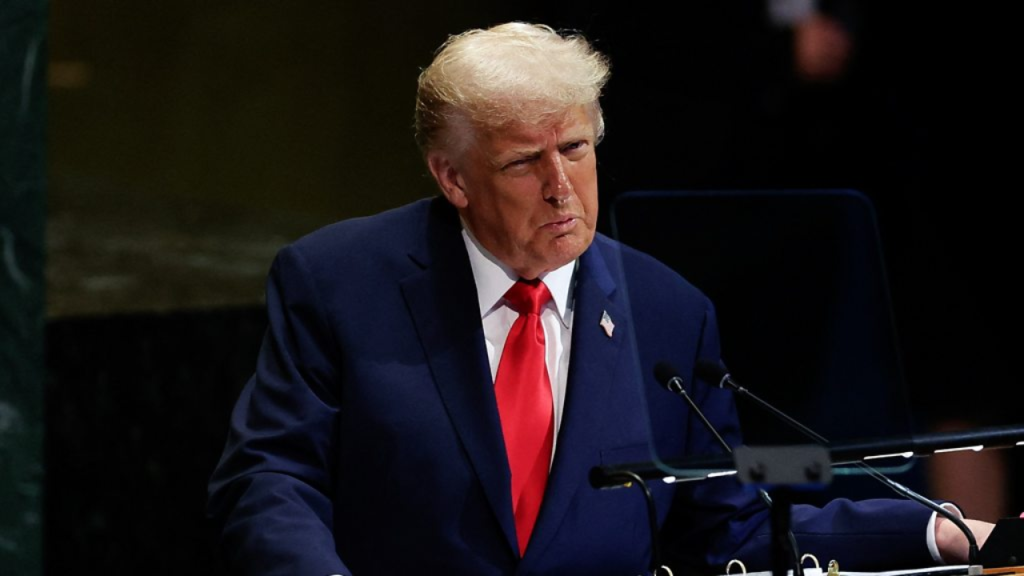Trump’s speech to the United Nations General Assembly was undiluted Trump. He defended America and the nation state while attacking multilateralism.
He also repeated his claim that he’s ended seven wars, although this claim is disputed. He also attacked the UN over its policies on migration and climate change.
1. Ending the war in Afghanistan
The United States launched its war in Afghanistan after the terrorist attacks of September 11, 2001, but the conflict is a stalemate. The country is still reeling from the loss of hundreds of American soldiers and thousands of Afghan civilians.
During his speech, Trump called on sovereign nations to unite against the true threats of globalism. He blasted global climate pacts that harm economic development by replacing traditional energy with costly renewables.
The president also touted his administration’s efforts to end conflicts between Israel and Iran, India and Pakistan, Egypt and Sudan, Rwanda and the Democratic Republic of Congo, Armenia and Azerbaijan, and Cambodia and Thailand. Experts, however, say the president’s impact on many of these conflicts is unclear. He criticized the UN for not stopping invasions of other countries, calling it an empty organization.
2. Ending the war in Syria
Over the last thirteen years, Syria’s civil war has shaped global politics in myriad ways. Its various stages have triggered shifts in regional and international alliances; led to the rise of terrorist organizations such as ISIS; unleashed brutal counter-revolutionary forces that left parts of the country reduced to rubble; and, through it all, brought millions of Syrians into exile.
Despite its many challenges, the country’s political transformation is a testament to the resilience of its people and to a growing international determination to hold perpetrators accountable. But a Syria that’s rebuilt will need to overcome lingering divisions and build an inclusive sense of national belonging. And, if it wants to avoid another collapse into dictatorship, it must shed crippling Western sanctions and stop Israel from meddling in its affairs. The world will watch its success or fail with great interest.
3. Ending the war in Iraq
On March 20, 2003, President Bush initiates a massive bombing campaign followed by a ground invasion. Coalition forces quickly defeat Iraqi forces and overthrow the Ba’athist government of Saddam Hussein.
On December 31, 2011, President Obama announces that all U.S. troops will leave Iraq by the end of that year, though he leaves open the possibility of a “modest-sized” contingent of US trainers staying on in the country after that date.
During his UN address, Trump lashed out at many of the United Nations’ key principles and made several controversial — and often factually inaccurate — claims. In particular, he attacked the organisation for its penchant for writing “strongly worded letters” with no follow-up and for giving asylum seekers false hope. He also slammed European leaders for their policies on migration and climate change. Ultimately, his speech was an angry and highly personal attack on his hosts.

4. Ending the war in Libya
In a speech at the UN General Assembly six years ago, Trump mocked “guns of war” that had shattered peace he himself had forged on two continents. Six years later, he has gone on to defend America and the nation state while attacking multilateralism, skepticism of climate change science, and global governance.
Libya has been a breeding ground for foreign interference and conflict ever since Muammar Qaddafi’s ouster in 2012. The country’s massive oil reserves have made it an open supermarket of weapons that have fueled both domestic political conflicts and neighboring regional ones.
In the absence of a legitimate government, armed militias such as Ansar al-Sharia, which attacked the US consulate in Benghazi in 2012, and Islamic State have taken advantage of the chaos to seize territory. More robust US diplomacy is needed, including public and private censure of the intervening countries, to end this destructive war.
5. Ending the war in Afghanistan
President Trump delivered a wide-ranging speech at the UN, attacking friends and rivals and making controversial – often factually inaccurate – assertions. He also took aim at the United Nations for failing to end conflicts.
The Trump administration has made an ill-advised deal with the Taliban, committing to withdraw troops despite the armed group violating their promises in previous talks. The resulting chaos could destabilize the country.
US officials cite a Marshall Plan model, drawing parallels to the post-World War II effort that revived Western Europe. However, the US and NATO nations do not spend anything close to Marshall Plan levels for Afghanistan reconstruction. And the country’s security forces are not yet ready to take over. Meanwhile, the Taliban is carrying out bold terror attacks in Kabul. This is not the path to peace. It’s a path to war.
6. Ending the war in Syria
The United States continues to conduct military and counterterrorism operations in Syria. However, the government does not control all of the country, and sectarian violence involving local communities and militias has recurred in recent years.
Millions of Syrians have been displaced within the country and around the region, resulting in severe economic disruption and creating fertile ground for recruitment by violent extremist organizations.
Trump’s speech was a mix of a defense of the nation state, assault on multilateralism, and stream of consciousness with questionable assertions. He began with a lighthearted joke about his non-functional teleprompter and then turned to harsh attacks on what he views as globalists and their agendas. In his most inflammatory remarks, he claimed that Ukraine would not be able to retake its territory without US help. His remarks were met with gasps from the audience.
7. Ending the war in Iraq
In the months leading up to the war, a majority of Americans believed that Saddam Hussein was behind the September 11 attacks, and that his regime had weapons of mass destruction. That same month, when Bush gave his “Mission Accomplished” speech, public support for the war climbed to 74%.
But in the years that followed, the U.S. military became increasingly bogged down in Iraq, and public opinion turned against the war. Today, many of those who once supported the invasion now recognize that it was a strategic failure. To reverse that failure, Congress must pass resolutions rejecting the national-interest and collective self-defense theories that led to the war, and demanding the withdrawal of forces from unauthorized hostilities. It must also bolster the War Powers Resolution, the 1973 law passed to prevent presidential war-making. And it must restore the public’s confidence in the United Nations.
8. Ending the war in Libya
As Libya’s war rages, it is essential for the UN to work with local actors to mediate conflict and build national dialogue. This includes USIP’s work in Sebha, where we support a civic group that has helped break the tradition of men firing bullets into the air to announce and celebrate family weddings.
But the United States needs to do more. It must engage more forcefully with intervening countries, including a combination of private diplomacy and public censure. It should also support a Libyan solution for resolving the war through a political process that incorporates women mediators, as peace processes that involve women are 35 percent more likely to last 15 years.
This would be an opportunity for Trump to end his assault on global institutions, and instead work with the United Nations to resolve the conflict in Libya.
9. Ending the war in Afghanistan
The speech was undiluted Trump – a defense of America and the nation state, an assault on multilateralism and globalism and a stream of consciousness with questionable assertions. His dismissal of Russia as a “paper tiger” will be particularly sensitive for President Putin, who is sensitive to any suggestion that his country is not a global power.
It is not clear whether the White House will change its policy in Afghanistan. The administration’s argument is that the United States can leave the war to Afghan forces and their NATO allies and still be successful because the Taliban will renounce Al-Qaeda, end its attacks on civilians and the government, and limit its activities. However, these claims lack common sense. Moreover, it appears that the strategy is pushing the new Afghan government towards neighboring countries like China and Russia.
10. Ending the war in Syria
The United States has led the air campaign against ISIS in Syria, while also providing support and supplies to Kurdish-led Syrian Democratic Forces and other anti-ISIS forces. It has resisted Turkish efforts to expel them from areas adjacent to the border and worked with the Syrian interim government and its forces to ensure their protection.
Since the conflict began in 2011, more than 11.7 million people have been displaced inside or outside the country. Many live in desperate conditions that can make them vulnerable to recruitment by violent extremists. And millions of children have grown up without the benefit of education. The regime of Bashar al-Assad continues to dominate the public narrative by presenting a binary choice between his rule and a popular revolt supported by foreign forces. However, this understanding is losing credibility as evidence mounts that the regime itself benefits from the rebels’ fragmentation.



